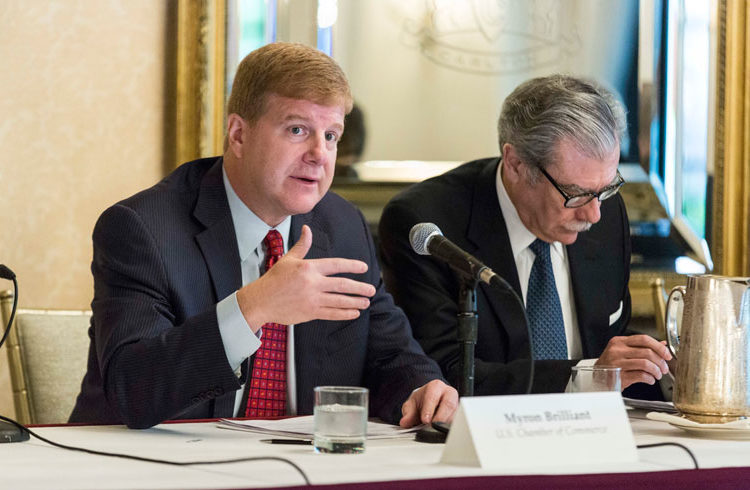The U.S. Chamber of Commerce regretted President Donald Trump’s decision to roll back the opening toward Cuba promoted by the Obama administration.
In statements Last Friday, Myron Brilliant, executive vice president and head of International Affairs of the commercial institution, pointed out that ‘‘unfortunately, today’s moves actually limit the possibility for positive change on the island and risk ceding growth opportunities to other countries that, frankly, may not share America’s interest in a free and democratic Cuba.”
Brilliant reaffirmed “US private-sector engagement” as a “positive force” that has an influence in the Cuban scenario.
“We remain committed to working with all relevant parties to remove the antiquated policies that hinder the empowerment of the American and Cuban people,” he said.
The statement recalls that the Chamber of Commerce’s Business Council “works with the U.S. Congress, the U.S. and Cuban public and private sectors, and other key stakeholders to remove barriers to trade and create jobs, growth and prosperity in both countries.”
Additionally, it urges the island’s government “to continue to make policy changes to lessen government control or ownership of Cuban businesses.”
The U.S. Chamber of Commerce is the world’s largest business federation. It represents more than 3 million businesses of all sectors, and regions, as well as state and local chambers and industry associations.
Its International Affairs division, which is headed by Myron Brilliant, includes more than 70 regional and policy experts and 25 country- and region-specific business councils and initiatives. Moreover, it collaborates with 117 American Chambers of Commerce abroad.
In January, a few days before the inauguration of Donald Trump, the president of the U.S. Chamber of Commerce, Thomas J. Donohue, visited Cuba with other executives from the institution. At the time he met with Cuban President Raúl Castro.
A bill to eliminate the barriers that prevent U.S. citizens from freely exporting their products to Cuba was presented in Congress in May by a bipartisan coalition. The bill repeals the key regulations of the act in force, which the Trump administration aims to apply in all its rigor.
When presenting the bill, Republican Senator Mike Enzi said that the strategy of isolating Cuba applied by the U.S. administration in the last half century has not been very successful and pointed out that this bill would offer new business opportunities to his country’s businesspeople.
Another bill, championed by Republican Representative Rick Crawford, seeks to favor U.S. agricultural exports to the island. The bill, which has the promised backing of Secretary of Agriculture Sonny Perdue, will include a two percent excise fee of the sales to Cuba to pay those who have certified claims of properties confiscated by the Cuban government since 1959.
EUROPEAN UNION RAPPROCHEMENT TO CUBA WILL NOT BE STOPPED
For German politician Knut Fleckenstein, spokesman of the European Parliament’s Social Democratic faction, the European Union’s efforts to achieve a rapprochement with Cuba will not be stopped by the cooling toward the island promoted by the current U.S. administration.
“I absolutely can’t imagine it,” he said.
In an interview published by the Deutsche Welle (DW) chain, Fleckenstein opined the cancellation of the Obama Agreement with Cuba “will fail, as all the foreign dictated policy since 60 years has failed.” In his opinion, “only through dialogue” will a greater democracy on the island be promoted: “that is not achieved by throwing overboard what has been achieved with the rapprochement.”
The politician advocates strengthening relations with Cuban citizens, supporting small enterprises and respect for human rights, as important points of the Social Democratic policy toward Cuba. Moreover, he pointed out that “commercial exchange must be attractive for both sides” and that “without basic reforms toward democratization relations cannot function in the long term.”
However, he affirmed, the changes cannot be achieved by “imposing orders.” “The only way for Cubans to achieve what they want is dialoguing with their government and not leaving civil society alone,” he concluded.
After 20 years of the so-called Common Position, the EU and Cuba signed a new Political Dialogue and Cooperation Agreement in December 2016.
“The agreement is the instrument through which the European Union can better support the process of economic and social modernization of Cuba. It is a framework to promote inclusive and sustainable development, to strengthen democracy and respect for human rights,” the European Union high commissioner for Foreign Policy, Federica Mogherini, said at the time.
Even though since it was signed the agreement came into force provisionally, for its definitive implementation it must be ratified by the national parliaments of the EU member states, as well as by the European Parliament and its different commissions.










